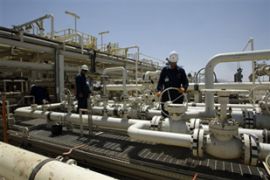Lukoil wins Iraq oilfield contract
Russian firm and its Norwegian partner win auction to drill untapped reserves.

Split of revenues
Lukoil and StatoilHydro, the Russian company’s Norwegian partner in the West Qurna-2 project, requested $1.15 for each barrel extracted from the oil field.
Lukoil will take 85 per cent of the revenue from extraction, while StatoilHydro will take the remainder. The companies expect to extract 1.8 million barrels a day from the field.
West Qurna-2, which has known reserves of 12.9 billion barrels, lies to the west of the Majnoon field, which was auctioned on Friday to Shell, an Anglo-Dutch company, and Petronas, a Malaysian firm.
Shell and Petronas will get $1.39 for each barrel of oil they extract from Majnoon, which has proven reserves of 12.6 billion barrels.
CNPC, a Chinese firm, led a group comprising Petronas and France’s Total on Friday to get access to the southern Halfaya oil field.
Each company in that consortium will receive $1.40 per barrel, based on projected production of 535,000 bpd.
Output target
Contracts were also agreed for access to the Garraf, Najmah, Qaiyarah and Badra fields.
Sonangol, an Angolan firm, will work in the Qaiyarah and Najmah oil field, which lie in the northern province of Nineveh.
A joint bid from Petronas and Japex, a Japanese company, took the Garraf field in south Iraq, while a consortium led by Russia’s Gazprom was awarded a contract to work on Badra, near the Iranian border.
Oil firms avoided bidding for fields in the most dangerous areas of the country, while companies that did not offer enough value for money were refused the chance to work the oil fields.
The auctions, the second to be held since June, come as Baghdad looks to kickstart its economy and generate income for the government.
Iraq hopes to raise oil production to seven million bpd within six years, from the current output of 2.5 million bpd.
At 115 billion barrels, Iraq has the world’s third-largest proven oil reserves, behind only Saudi Arabia and Iran. Oil sales provide 85 per cent of government revenues.